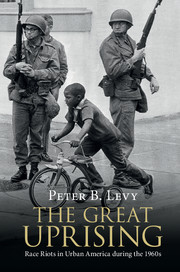Crossref Citations
This Book has been
cited by the following publications. This list is generated based on data provided by Crossref.
Spector, Alan J.
2019.
The Palgrave Handbook of Social Movements, Revolution, and Social Transformation.
p.
151.
Gioielli, R.R.
2020.
“Pruitt-Igoe in the Suburbs”: Connecting White Flight, Sprawl, and Climate Change in Metropolitan America.
Amerikastudien/American Studies,
Vol. 65,
Issue. 2,
p.
213.
Rocksborough-Smith, Ian
2020.
Hope and Despair in Twentieth-Century Black Chicago.
The Journal of African American History,
Vol. 105,
Issue. 1,
p.
112.
Ziane, Sid Ahmed
2021.
“Today the Pot is Boiling Over!”: Ebony Magazine, the Black Revolts, and the Search for a Social Resolution, 1966-1967.
European journal of American studies,
Vol. 16,
Issue. 2,
Murphy, Caryn
2021.
Script Development.
p.
85.
Rothenberg, Julia
2022.
Arts and Power.
p.
21.
Howard, Ashley
2022.
Whose Streets? Wielding Urban Revolts as Political Tools.
The Journal of African American History,
Vol. 107,
Issue. 2,
p.
238.
Brooks, Leah
Rose, Jonathan
and
Veuger, Stan
2022.
Destruction, Policy, and the Evolving Consequences of Washington, DC’s 1968 Civil Disturbance.
SSRN Electronic Journal ,
Jenkins, Jeffery A.
and
Peck, Justin
2022.
Foreshadowing the Civil Rights Counter-Revolution.
Du Bois Review: Social Science Research on Race,
Vol. 19,
Issue. 2,
p.
329.
García Martín, Juan Andrés
2022.
La lucha contra la segregación racial y por los derechos civiles en Estados Unidos.
El Futuro del Pasado,
Vol. 13,
Issue. ,
p.
451.
Hornbostel, Brendan
2022.
'Public order is the first business of government': The Law Enforcement Assistance Administration and the making of a liberal counterinsurgent police-industrial complex.
Small Wars & Insurgencies,
Vol. 33,
Issue. 4-5,
p.
607.
Stern, Walter C.
2023.
“We Got to Fight for What We Want”: Black School Rebellions In Louisiana, 1965–1974.
Teachers College Record: The Voice of Scholarship in Education,
Vol. 125,
Issue. 3,
p.
319.
2024.
The Second Battle for Africa.
p.
1.
2024.
The Second Battle for Africa.
p.
147.
2024.
The Second Battle for Africa.
p.
283.
Wacquant, Loïc
2024.
Lessons from the tall tale of the ‘underclass’: A response to my critics.
Dialogues in Human Geography,
Vol. 14,
Issue. 3,
p.
560.
2024.
The Second Battle for Africa.
p.
359.
2024.
The Second Battle for Africa.
p.
215.
2024.
The Second Battle for Africa.
p.
177.
2024.
The Second Battle for Africa.
p.
111.



